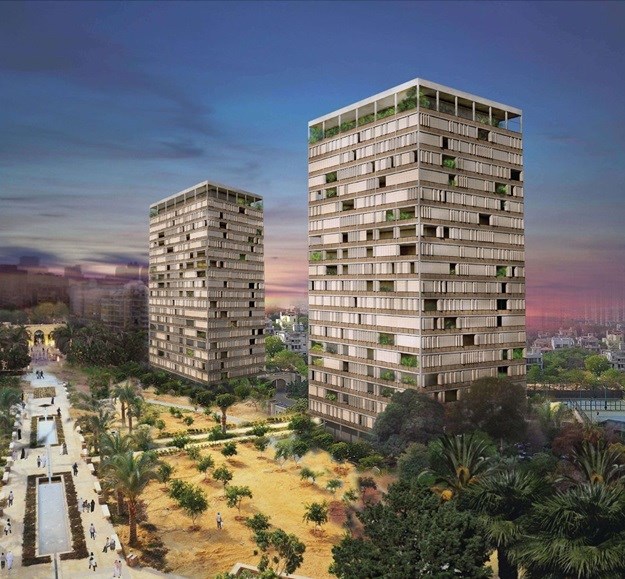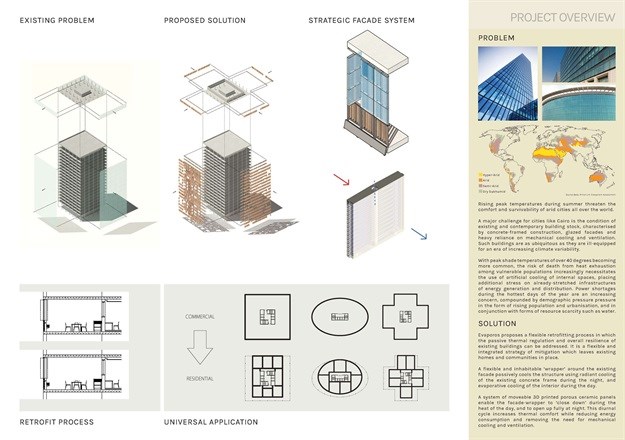With peak shade temperatures of over 40°C becoming more common in African cities, the need to artificially cool and ventilate buildings is consuming more energy and increasing stress on already-stretched infrastructures of energy generation and distribution.
Flexible retrofitting process
The multidisciplinary design team from the UK proposed a flexible retrofitting process in which the passive thermal regulation and overall resilience of existing buildings can be improved, while leaving existing homes and communities in place. A flexible and inhabitable ‘wrapper’ around the existing facade passively cools the structure using radiant cooling of the existing concrete frame during the night, and evaporative cooling of the interior during the day.
The system, named Evaporos, uses moveable 3D printed porous ceramic panels to enable the facade-wrapper to ‘close down’ during the heat of the day, and to open up fully at night. This diurnal cycle increases thermal comfort while reducing energy consumption and removing the need for mechanical cooling and ventilation.
The eight-man team, which came up with the idea, is one of 12 entrants on the final shortlist, which has been narrowed down from more than 1,200 entries. Heat Island Limited is now in with a chance of winning the competition’s £50,000 prize.
RICS is running the competition to encourage young people around the world to think about the challenges facing the world’s cities and to draw upon their imagination and innovative ideas to create real, practical solutions that global cities can implement.
Major need for cooling solutions
Joseph Augustin, one of the team leads, said: "As peak temperatures across Africa and the world continue to rise, there is a major need for cooling solutions which avoid creating additional energy load. Evaporos is a response to the specific problem of already-existing buildings, as well as an opportunity to enhance public space and social infrastructures in arid megacities. As a young multidisciplinary design team, we’re delighted to have the opportunity to work with a mentor to develop and further explore the potential of our idea."
With three million people moving to cities every week, the rapid expansion of urban areas the world over is putting ever more strain on infrastructure and services. Many city dwellers live in slums or poor quality housing or have to contend with poor air quality and inadequate transport links.
Global winner
The next step in the Cities for our Future competition run by RICS, in partnership with the United Kingdom National Commission for UNESCO and the Association of Commonwealth Universities, will see each of the 12 finalists given a RICS mentor to help them develop the idea in advance of the final judging in November. The overall winner will be announced at a ceremony in November.
Joshua Askew of JLL, head judge of the regional judging panel for Africa said: “We were impressed by the quality and quantity of entries for Africa. Our continent has a rapidly growing urban population and is particularly vulnerable to the impacts of climate change. This idea stood out because of the simplicity of the solution it provides to the problem of cooling buildings without using more energy. We wish Heat Limited and all the finalists good luck and hope that we will get the opportunity to pilot their ideas in African cities.”













